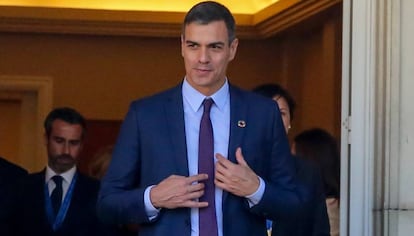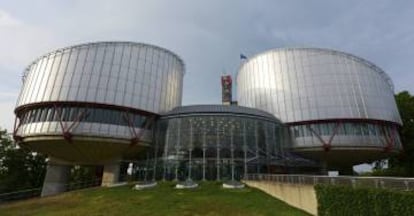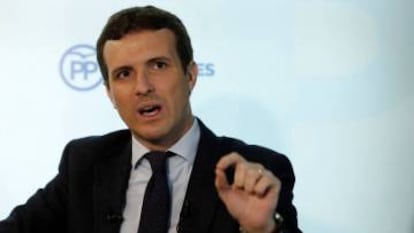Prime minister goes to Strasbourg to defend Spanish democracy and law
Pedro Sánchez will meet with the head of the European Court of Human Rights and give a speech to respond to Catalan separatists’ arguments that there are political prisoners in Spain

As the trial of Catalan secessionist leaders approaches, and with a fresh crisis on his hands over the decision to include a “rapporteur” in political talks between Madrid and Barcelona, Spanish Prime Minister Pedro Sánchez is due to fly to Strasbourg on Thursday to support Spain’s push-back against Catalan separatists’ campaign to cast doubt on the Spanish justice system.
For Sánchez, of the Socialist Party (PSOE), it will be his second trip to Strasbourg in a month. His agenda includes visits to the European Court of Human Rights and to the Council of Europe, less than a week before the start of the Catalan separatists’ trial at Spain’s Supreme Court.
A recent editorial in Britain’s ‘The Times’ described the upcoming trial as the “Spanish Inquisition”
The defendants’ legal team is ready to appeal to the European Court as a last resort, and lawyers are working to convince public opinion in Europe that their clients are being subjected to a political trial back home.
This will be the first time that a Spanish PM has visited the Strasbourg court and held a meeting with its president, Guido Raimondi. Such meetings are more commonplace elsewhere in Europe – Angela Merkel of Germany and Emmanuel Macron of France recently paid similar visits.
Although officially no more than a courtesy call, Sánchez will take the opportunity to defend Spain’s justice system and democracy at a speech in the Council of Europe.
His address will try to counter messages from Catalan separatists equating Spain with a dictatorship, an idea that is starting to take hold in certain European quarters: a recent editorial in Britain’s The Times described the upcoming trial as the “Spanish Inquisition.”
During his earlier visit to Strasbourg less than a month ago, Sánchez came under fire from some members of the European Parliament who criticized the fact that there were politicians in jail awaiting trial in Spain. The Spanish leader noted that the secessionists facing trial are not in prison for their ideas, but because they violated constitutional laws despite reiterated warnings from the courts.

Government sources said that Sánchez’s speech will recognize the Strasbourg court’s role as the top authority on human rights in Europe, while stressing the quality of Spain’s democracy. Sánchez recently noted that Spain is on The Economist’s 2018 list of full democracies, a ranking from which the United States has been removed.
“He will underscore that the essence of modern Spain is the rule of law, where individual rights, public liberties and the rights of minorities are guaranteed and protected,” said a source at La Moncloa, the seat of the Spanish government.

Meanwhile, Madrid is running an international campaign called “This is the Real Spain,” and Justice Minister Dolores Delgado has met with three dozen foreign correspondents in Spain to convey the message that there are no political prisoners in the country, and that the defendants will enjoy all the legal guarantees of a consolidated democracy.
The government is trying to play catch-up on the international front after the previous administration chose to keep a low profile while the Catalan independence movement spread its messages abroad.
An ongoing struggle
Sánchez, who is leading a minority government and could face early elections this year if his budget plan gets rejected, made improving relations with the Catalan government a priority after he took power in a successful no-confidence vote against Mariano Rajoy, of the Popular Party (PP).
But eight months later, his overtures could prove of little use if the Catalan pro-independence deputies sitting in Spain’s Congress vote against his budget plan on February 13. On Monday, these groups said they would veto the blueprint unless Madrid made some gesture in favor of the individuals about to stand trial for leading the unauthorized referendum of October 1, 2017 and the subsequent unilateral independence declaration inside the Catalan parliament.
On Wednesday, the central government revealed plans to include a “rapporteur” in cross-party talks between Madrid and Barcelona, a move that has rallied Spain’s center-right parties against Sánchez. He has been described as a “traitor” by the new PP leader, Pablo Casado, and a demonstration is planned for this coming weekend in Madrid to “throw [Sánchez] out” from office.
English version by Susana Urra.
Tu suscripción se está usando en otro dispositivo
¿Quieres añadir otro usuario a tu suscripción?
Si continúas leyendo en este dispositivo, no se podrá leer en el otro.
FlechaTu suscripción se está usando en otro dispositivo y solo puedes acceder a EL PAÍS desde un dispositivo a la vez.
Si quieres compartir tu cuenta, cambia tu suscripción a la modalidad Premium, así podrás añadir otro usuario. Cada uno accederá con su propia cuenta de email, lo que os permitirá personalizar vuestra experiencia en EL PAÍS.
¿Tienes una suscripción de empresa? Accede aquí para contratar más cuentas.
En el caso de no saber quién está usando tu cuenta, te recomendamos cambiar tu contraseña aquí.
Si decides continuar compartiendo tu cuenta, este mensaje se mostrará en tu dispositivo y en el de la otra persona que está usando tu cuenta de forma indefinida, afectando a tu experiencia de lectura. Puedes consultar aquí los términos y condiciones de la suscripción digital.








































